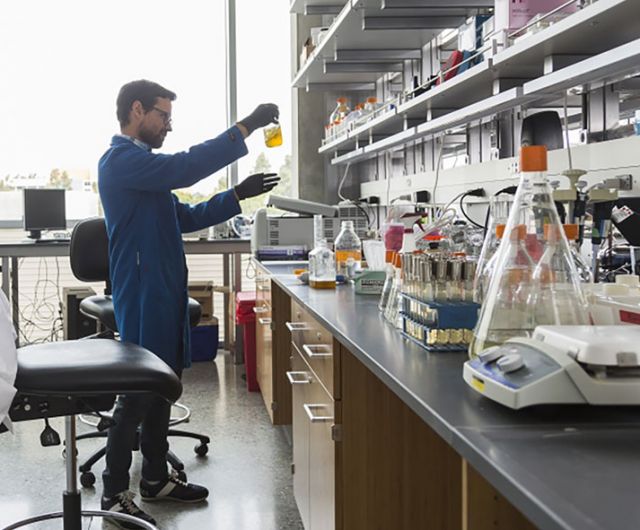UCSB: "Research Ramp-Up"
College of Engineering Dean Rod Alferness and ECE Professor Jonathan Klamkin interviewed about the strict safety protocols and modifications for on-campus research operations gradually resuming after COVID-19 cessation

Some three months after the pandemic forced their hard stop, research activities are in the process of resuming on campus. It will be a slow return, with myriad protocols and modifications in place.
“Now that the state has started to open up some areas of the economy that present low health risks, we too want to get going because we are confident we can do laboratory research with low risk,” said Joe Incandela, vice chancellor for research. “We are in the process of ramping up research now very thoughtfully and methodically.”
The overall plan, guidelines and educational materials the Office of Research is providing to researchers for this resumption are the culmination of a months-long effort by stakeholders in the Office of Research and across campus. They are the result of consultations with experts and from meetings with colleagues across the UC system and across the country, as well as reviews of industrial laboratory programs and those of national and international laboratories in fundamental science. “I am deeply grateful to all those who have contributed to these preparations — especially the Office of Research staff,” Incandela said. “It involved an extraordinary amount of study, a lot of meetings and many long days over the past three months.”
Rod Alferness, dean of the College of Engineering, said, “After a nearly three-month coronavirus closure, we are excited to be able to re-open labs in the college. Our laboratories are where much of the important work is done to generate solutions that help to make life better. Perhaps even more important is the role that labs play in the teaching component of our mission, for it is there that students acquire the deep learning and experience they need to be successful in their careers.”
A limited amount of essential research has continued through the shutdown. Some of that work was being conducted at the UCSB Nanofabrication Facility, run by electrical and computer engineering faculty director Jonathan Klamkin. Pre-COVID-19, Nanofab, as it’s known, supported some 600 users from the university and local industry.
With significant safety protocols and engineering controls already in place, including full linen gowning and HEPA-filtered cleanroom air handling, Nanofab was in a unique position to remain open under limited operation. It did so, Klamkin said, initially to support COVID-19 research and DoD critical programs, and to serve as a sort of ‘test case’ for how to operate during the pandemic.
“We constructed a detailed set of new protocols to enable safe social distancing and to minimize transmission,” he explained. “This required additional PPE, modified entry and exit procedures, extensive cleaning protocols, relocation of some equipment, distancing rules and many other actions. And the most important aspect of our operation was the recognition that we should record as much data as we could, observe, learn and modify and improve our protocols regularly.”
“The education and training that our students and researchers receive while carrying out sponsored research is crucial to their growth and development,” Klamkin said. “Access to laboratories is essential for their training, and although our lab practices will look different for the foreseeable future, we are all looking forward to getting back in the labs.”
To learn about the three principles in the overall plan and more see:
The UCSB Current – "Research Ramp-Up" (full article)